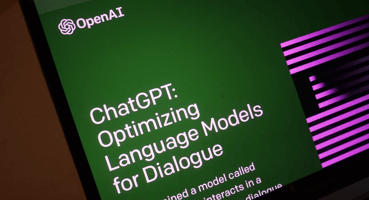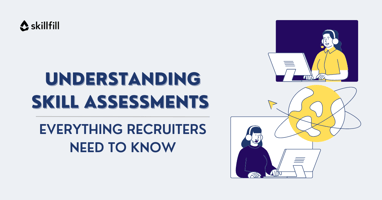The use of AI and tools like ChatGPT is surging, and recruiting is one of the most interesting use...
Will AI replace recruiters?
Simplified answer: No.
A more elaborate answer: It is complicated. So let's use Terminator 2 as an analogy to better understand the situation. This will make it easier, trust me.
AI is indeed a danger since it can perform many tasks better than a human being could ever do. So in a way you could think of AI being a T-1000, whose purpose it is to fight against human beings, and thus one goal of AI could also be replacing recruiters.
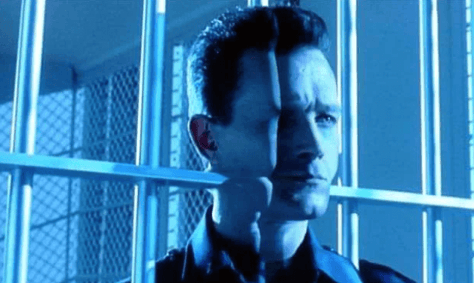
In fact, with the launch of ChatGPT we all know what AI is capable of. There are some who believe that it’s evolved way beyond the boundaries of human understanding - one such person would be Google engineer Blake Lemoine, who claimed that Google’s AI-based algorithm is now ‘sentient’ and developed feelings. He was fired from Google, but his claims sparked many debates, and until today, the discussion is very controversial and more prominent than ever.
Great news is that there is also a 'good AI' - the T-800 in our example. And you probably guessed it: You as a recruiter are pretty much John Connor. And we know: They are a great team. And we also know: In Hollywood the good guys win.
What you might not know: We live in a Hollywood movie. So no, AI will not replace recruiters, but it will be on us to use AI for good and build a dream team like John Connor and T-800.

In this article you will learn more about how data is used to support decision-making and why, especially in HR, it is not advised (and in my opinion will not happen) that a machine will make decisions for us.
Tasks that AI can take care of in recruitment
Having clarified the roles, it is now time to deep dive into what the T-800 and T-1000 are capable of and how they differ. To explain this, it is important to understand that AI is closely related to Analytics systems. Gartner has a great visualization that shows what kind of questions can be answered with such Analytics systems.
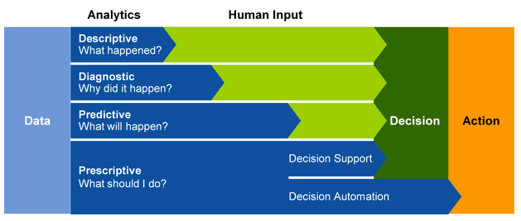
Data is feeding Analytics and AI systems, and depending on the task at hand, human input is needed or not. A Terminator movie, where machines are solving recruiting problems is yet to be produced, but we can imagine what the T-1000 and T-800 would be doing in this movie. They would be answering questions like:
- What happened? If we feed e.g. ChatGPT with a CV and ask what skills a candidate has, this is Descriptive Analytics. With this information, we are still far away from making a decision on who to hire or whether to forward a candidate to follow up interviews.
- Why did it happen? We could go one step further and try to understand why a candidate has certain skills. Is it because of a certain project, where a candidate applied Python and, after 5 years, is now proficient? This step is about the ´Why?´.
- What will happen? When it comes to Predictive Analytics, we could e.g. take all feedback notes, recordings from interviews, results from skill assessments, the CV etc. and use AI or other systems to try answering the question: Will this person perform well at a job?
- What should I do? All those prior questions are very interesting and we can use computers with less and more sophisticated models to answer them. It is only when we go to the last step and ask ´What should I do?´ that machines could potentially really replace us. ´Who should I hire?´ is the question that leads to decision-making.
Good AI versus bad AI
While the T-1000 is capable of answering all the mentioned tasks and can make its own decisions, the T-800 relies on human input in any case. So now it's clear who is good or bad, but we still don't know who will win.
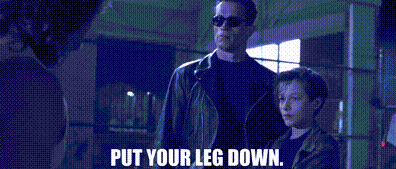
Pros and Cons of AI in recruitment
AI is faster in processing information
Storing and processing data is easy for computers. Try to feed ChatGPT with a book and ask for a summary. How much faster is the machine accomplishing this task than a human being? Machines are just faster and I have described 3 HR tasks that can be easily solved in seconds using ChatGPT.
AI is more reliable
Another advantage is that machines don't need to rest. They will repeat a task without any loss of performance. Remember when you last went through a pile of resumes? Our eyes are getting heavy quite quickly and especially when it comes to monotonous tasks, human beings can easily lose their concentration.
AI is bias-free
This one is a bit more tricky as it highly depends on how the actual algorithms work in the background. While there are examples of bias in AI systems, it is actually the human beings that develop those systems that introduce such a bias. But algorithms themselves are bias-free. In my opinion it is very important to understand how AI systems work to avoid getting biased results. I have described in detail how AI-powered skill assessment can get rid of gender bias as an example.
But: AI cannot read between the lines
While AI is better than human beings on many levels, we are simply much better when it comes to drawing conclusions and understanding abstract concepts. Melanie Mitchell has written a superb article describing how we as human beings are better than AI. A simple concept like ´being on top of´ is actually highly complex. Machines struggle understanding the different abstractions of this concept: I could be on top of the world, but also be on top of a car. Even as children we learn to read between the lines and understand language in a certain context. LLMs like ChatGPT are relying on statistics here. They don´t understand what they ´read´. LLMs are like parrots simply repeating what they found on the Internet (putting this information together in a very impressive way though - and it will only get better!)
AI and recruiters: Hiring the best talent requires teamwork
In order for AI to be able to replace recruiters, machines would need to be better at decision making than human beings. This is where the controversy comes from: People have different opinions on this point. In my opinion HR and AI is a great combination. Some decisions can be supported using AI and other technical systems, while the actual decision making stays with recruiters. We are talking about decisions like 'Who to hire?´ and let´s be clear here: This is a highly complex decision. You really wouldn't want to let the T-1000 answer such a question by itself. Not as a recruiter but also not as a business owner.
Let AI support you in identifying the best talent
AI will not replace you as a recruiter. If a concept like ´being on top of´ is too complicated for AI to be grasped, then reading between the lines, when talking to candidates, is for sure not replaceable. Feeling passion in someone´s voice. Bonding because of similar interests and experiences. This is all part of the decision-making when it comes to answering ´Who to hire?´. We do have flaws though and need to be cautious about bias. This is why we need a T-800.
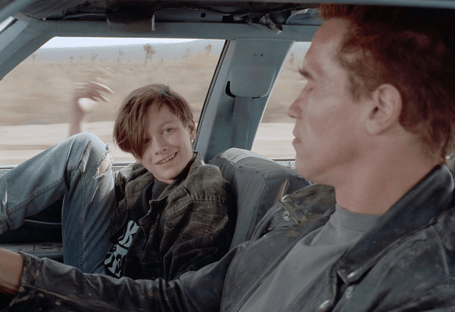
If you are interested in seeing a T-800 in action, check out how our software skillfill.ai can help you implement skills-based hiring using AI-powered skill assessments - click 👇
AI-ASSISTED TALENT ASSESSMENT FOR TECH RECRUITERS
Start your 14-day free-trial today!

